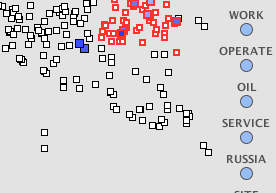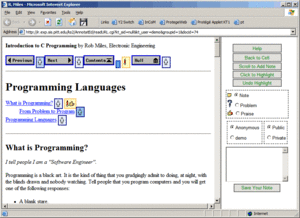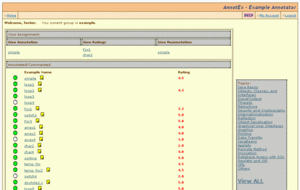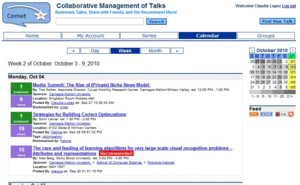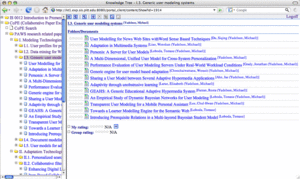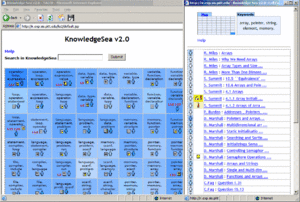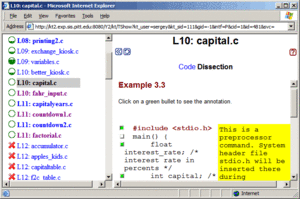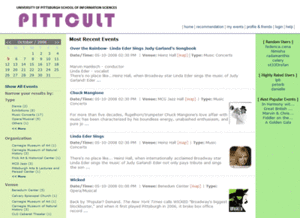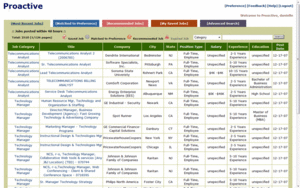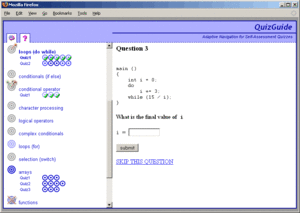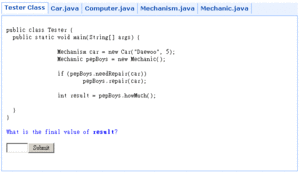This page is a quick overview of the systems developed at PAWS lab.
Adaptive Document Visualization - ADVISE
ADVISE 2D
Two dimensional document visualization based on inter-document similarities. The locations of the documents on the 2D space are determined by their similarities to another documents and users can visually see the relationships of the documents based on their contents.
ADVISE 3D
Three dimensional visualization of documents based on similarities. By adding one more dimension to 2D visualization, users are able to explore the document space more easily and access each document.
ADVISE VIBE (or Adaptive VIBE)
|
|
Two dimensional visualization based on POIs(Point Of Interest, or concepts) and document similarities. The position of the documents are calculated by their relationships with each POI.
|
(more on ADVISE)
AnnotatEd
|
|
AnnotatEd is a system that enables learners to annotate online pages while keeping track of all activities of learners. AnnotatEd uses the learners' activity information to offer social navigation support for hyperlinks inside the AnnotatEd system. (more)
|
AnnotEx
|
|
AnnotEx - Example Annotator- is a web-based community based authoring tool for annotating programming examples.(more)
|
COMET
|
|
COMET is a social system for sharing informaion about research talks. It allows to collaboratively collect, publish, and tag interesting research talks in Pittsburgh. COMET allows its users to schedule the talks they want to attend. It also automatically reminds about bookmarked talks and recommends other talks that fits isers' interests. (visit COMET)
|
CoPE (Collaborative Paper Exchange)
|
|
CoPE - Collaborative Paper Exchange - is a system that provides community-based access to paper summaries via web. CoPE is currently an in-class tool for both teachers and students. (more)
|
CourseAgent
coming soon
(more)
CUMULATE
CUMULATE is a centralized user modeling server built for the ADAPT2 architecture. It is mainly targeted at providing user modeling support for adaptive educational hypermedia (AEH) systems. CUMULATE maintains as set of overlay models of stidents' knowledge. It uses several techniques for computing student models, including: thresholded averaging, asymptotic user knowledge assessment, time-spent-reading.
(more)
Interbook@AHA!
coming soon
(more)
Knowledge Sea II
|
|
Knowledge Sea II is an extension of Knowledge Sea project that is designed to help users navigate from lectures to relevant online tutorials in a map-based horizontal navigation format. The most important feature of Knowledge Sea is facilitating the navigation through providing traffic and annotation based social navigation support. (more)
|
Knowledge Tree
|
|
Knowledge Tree is a link aggregating portal. It presents content structured according to the folder-document paradigm. Knowledge Tree provides authentication and authorization and implements a simplified form of access control. It supports collaborative authoring and social annotation. (more)
|
News Personalization & Exploration Systems
TaskSieve
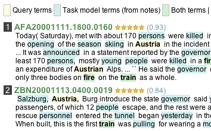 TaskSieve -- mediates query and user model |
An experimental personalized news search system based on task models and the interface to mediate between the query and the task model. Users can select three options (1) query only, (2) task model only, and (3) both. (more)
|
NameSieve
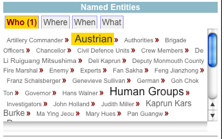 NameSieve Named-entity Navigator |
A name-entity based news exploration and filtering system. Important named-entities extracted from the search results are provided in the "cloud" form and helps further exploration. (more)
|
YourNews
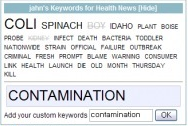 YourNews Open User Model UI |
YourNews is a news recommendation system based on the RSS feeds collected from various news sources. News articles are crawled every two hours, indexed, and then provided to users according to their specific needs. Users also can view and control their user profile with Open User Profile (more)
|
YourSports
coming soon
(more)
NavEx - Navigation to Examples
|
|
NavEx provides adaptive guidance for accessing online interactive examples. Adaptation allows students to visualize both whether they are ready to explore certain examples and what is their progress with them. NavEx-SN (SN for social navigation) also allows students to relate their progress with the progress of the group. (more)
|
PERSEUS
|
|
PERSEUS is a Personalization Service Engine. It provides adaptive support for non-personalized (educational) hypermedia systems by abstracting content presentation/aggregation from user modeling. PERSEUS protocols are based on RDF and RSS 1.0. Although, PERSEUS was initially developed for ADAPT2 framework, its data model permits seamless support of any other hypermedia application. Currently PERSEUS provides social navigation, topic-based navigation, concept-based navigation, and adaptive filtering techniques. (more)
|
PittCult
|
|
This project is to recommend interesting information using the combined technology of collaborative filtering and trust-based human network. This system is to overcome the emerging problems regarding collaborative filtering recommendations and to investigate how the information propagation is affected by trust among people. (more)
|
Proactive
|
|
The Proactive is content-based recommender system which is based on several knowledge engineering technology and personalized techniques. The system is proprietary to each user by collecting various user's usage patterns. I am particularly interested in how to efficiently make suggestions from multi-faceted point of view. (more)
|
QuizGuide
|
|
QuizGuide, is an adaptive system that helps students in selecting most relevant quizzes for self-assessment of C knowledge. Quizzes are assigned to topics and adaptively annotated, to show which topics are currently important and which require further work. (more)
|
QuizJET
|
|
QuizJET is a system serves quizzes as a self-assessment Java Evaluation Tool. It's mainly used to assess students' knowledge in Java Programming Language. QuizJET randomly generates a question parameter, creates a presentation of the parameterized question in a Web-based quiz, compares student's input to the correct answer which QuizJET runs the parameterized code "behind the stage", and records the results into a server-side database. (more)
|
WADEIn (cWADEIn/jWADEIn)
coming soon
(more)

